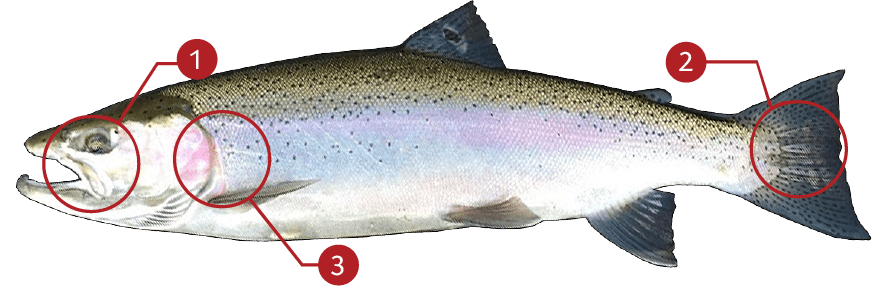STEELHEAD
How to identify a Steelhead
Steelhead are sea-run versions of rainbow trout but lack the ‘rainbow’ coloration, being silver with black dots sprinkling all sides. By contrast, the fish known as the rainbow trout will be much more colorful and live solely in freshwater. The steelhead and its closest relatives in the Pacific salmon group (cutthroat, golden, Mexican golden, Arizona native or Apache, and gila trouts) are known as the black-spotted trouts because they are covered with numerous prominent black spots. These spots may cover the entire body or may be more abundant near the tail. The spots characteristically extend onto the dorsal fin, the adipose fin, and the tail. Those on the tail radiate outward in an even, orderly pattern. Spots may or may not be present on any of the lower fins and there are never any red spots such as occur on freshwater and spawning specimens of brown trout and Atlantic salmon.Steelhead are a highly sought after species on the Pacific Coast and in the spring and summer, small runs of fish will average around two or three pounds. During the fall runs of steelhead, 10-15 pound fish are very common and they are known to reach weights of over 40 pounds.
Where to catch Steelhead
These fish are native to tributaries of the Pacific Ocean in Asia and North America and have been introduced for food or sport to at least 45 other countries. The steelhead is an anadromous fish that will live most of its life in the saltwater of the Pacific Ocean. After about 2-3 years, these fish will look for freshwater tributaries and estuaries to enter so that they may spawn in the freshwater.
IDENTIFICATION

| |
Head blunt, jaw short - does not extend past the eye |
| |
Square-shaped tail fin with radiating pattern of spots |
| |
Often has reddish stripe along sides, gill cover reddish |
TARGET AREAS
|
|
Acknowledgements: We thank TAKEMEFISHING.org (www.takemefishing.org), Wisconsin Department of Natural Resources, Indiana Department of Natural Resources for their contributions to these FISH FACTS.

